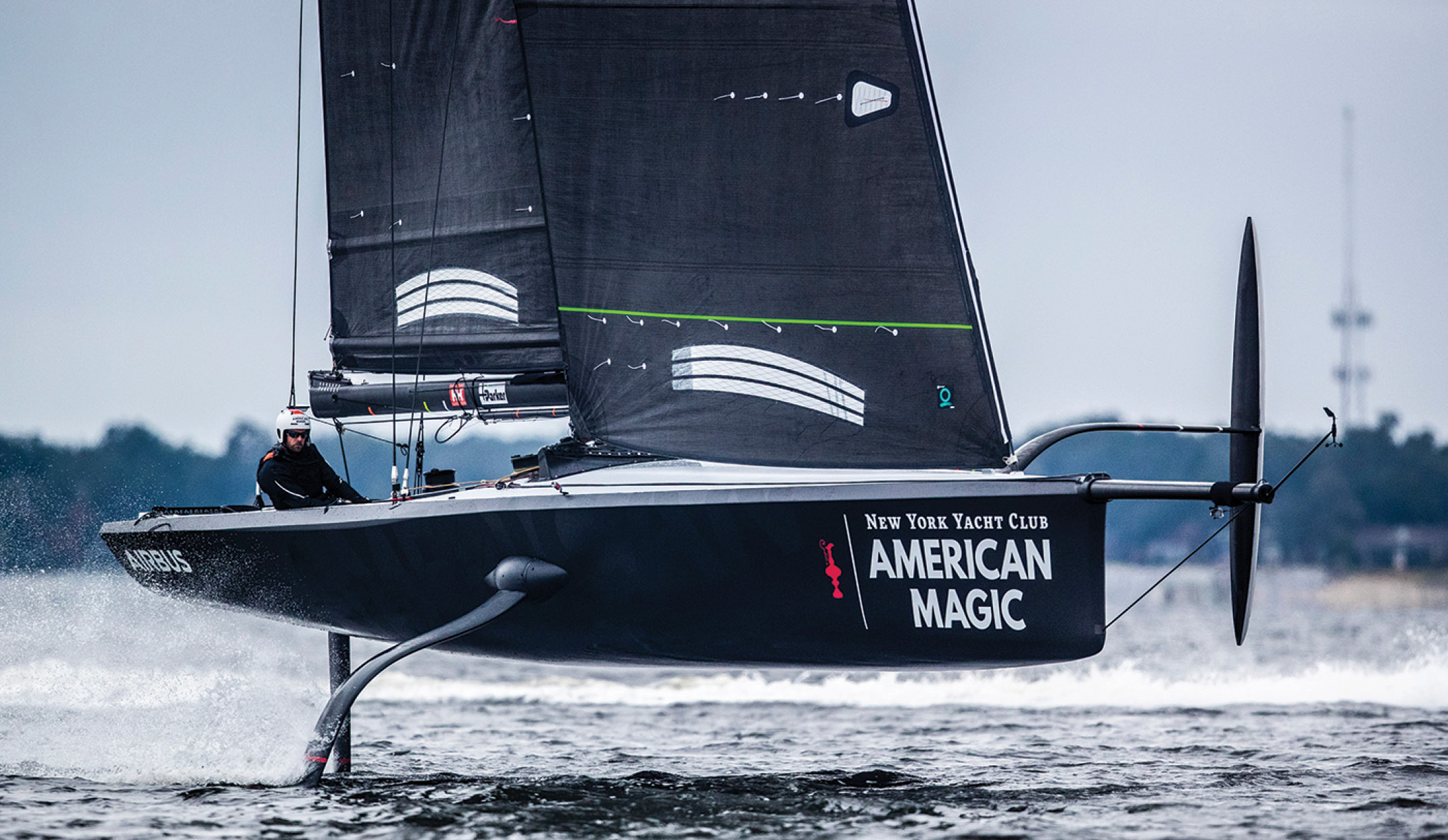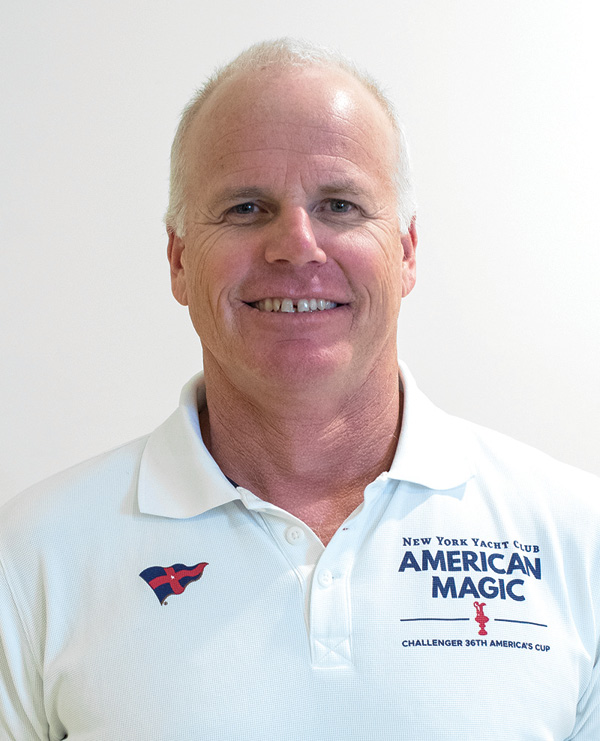In 1851, members of the New York Yacht Club won the very first race for the trophy that became known as the America’s Cup, successfully defending the title twenty-four consecutive times before being defeated in 1983 – the longest winning streak in all sports. The 36th America’s Cup presented by Prada will be sailed March 6 – 21, 2021 in Auckland, New Zealand. The trophy’s current holders, the Royal New Zealand Yacht Squadron and their team, Emirates Team New Zealand, may well be the toughest Defender in the event’s 168-year history, but the New York Yacht Club wants to bring America’s Cup back home.
I caught up with past shipmate (not “old shipmate”…we’re not old) Terry Hutchinson this past winter when he graciously spent some of his holiday break to talk about his history with the state of Rhode Island and the New York Yacht Club American Magic America’s Cup campaign. After reminiscing on some IMS glory days which we shared in the late ‘90s, we got down to business.

The Mule, New York Yacht Club American Magic’s 38-foot test boat, in flight near the team’s winter training base in Port of Pensacola, FL. © Amory Ross/American Magic
WindCheck: Terry, you are from Annapolis of course, and did your college sailing at Old Dominion University, but after that, you came to Rhode Island to begin your professional sailing career.
Terry Hutchinson: Actually, no. My first sail making job was working for Ed Reynolds in Traverse City, Michigan. After that great experience, I moved to Newport to work for Bill Shore, and continued on in Newport working for Dan Neri and Ken Read.
WC: So, who stands out as influential mentors to your career from that period?
TH: There are so many great sailors in the Northeast corridor; so much tradition of producing great sailors. Friends like Ed Adams have been fantastic mentors and teammates at the same time. But Bill Shore’s guidance was a true “foundation” from which to build.
WC: What were the keys that Bill instilled?
TH: Bill taught me that you can’t win the regatta in the first race. What that means is that to have a chance to win the regatta, it is the weeks and months before that race where you build the speed to have a shot, the teamwork to execute, and all of the preparation beforehand that makes it possible. And then, he taught me that once you have done all of that, and you are there on the starting line of the first race, you have to realize that there are fifteen other teams that have done the same thing to be ready.
WC: Fast forward to now. You are back in Rhode Island, leading an effort for the most storied club in America’s Cup history, the New York Yacht Club. But a lot has changed. Now you are running a professional sports team…in arguably one of the most complex sports challenges on the planet.
TH: That’s correct. New York Yacht Club American Magic is a professional sports team and yes, the technological complexity, especially in the first cycle of a new design, requires constant development and pretty major decisions that started months ago and will happen all the way along to that first start.
WC: That leads us to another potential mentor, one of your Team Principals, Roger Penske. (For readers unfamiliar with the man known as “The Captain,” he is the most successful auto racing team owner of all time. Team Penske is often referred to as the New York Yankees of auto racing…or for the northern half of the WindCheck Community, the Patriots/Red Sox/Bruins/Celtics of auto racing).
TH: Team Penske has more than 500 members; we have just north of 100. One of the biggest management lessons from Roger is simple: Every single person has to have a single and foremost goal, and that is to win. If that is the case, then the rest is pretty straightforward…do your specific job the absolute best you can. If this is followed, then not everyone needs to know everything. Each team member can be confident in their teammates’ commitment, and thus focus 110% on their “lane.” This is critical in this complex a program where time is probably the most valuable asset.

Terry Hutchinson © Amory Ross/americanmagic.americascup.com
WC: It sounds “Belichickian” – the “do your job” mantra.
TH: Well, Coach Belichick is famous for finding undervalued players and plugging them into the winning systems he builds with that “stay in your lane…do your absolute best” mode (paraphrasing, of course). But the America’s Cup is a different beast entirely. You need hugely talented people in every position. And all of those talented people have to leave their egos at the door, trust their teammates and focus. If we don’t, as a team, we won’t make the progress needed to be successful.
WC: That’s a nice segue to the next thing I want to poke at. My observation is that Emirates Team New Zealand is extraordinary and have been at the top of the America’s Cup game because they have taken a “start and stop and start over again” type of competition model and created continuity in their team, even with boat changes or when bringing in young or new talent. They seem to have a fantastic “machine” and culture. How do you hope to compete with that?
TH: This is really why American Magic is so unique, amongst the challenging teams, anyway. Our other Principals, Doug Devos and Hap Faugh, have run world championship racing programs for decades, with Quantum Racing and Belle Mente, that I and others on the team have been fortunate to be a part of. That, plus as you mentioned, Roger Penske’s career, and we think we have that experience and continuity to win, and that has driven a lot of our Team selection processes. You have to understand that this isn’t just about the team sailing on those boats. Those programs also involved the designers, coaches, sail makers, builders, shore crew, etc. So our depth is really there. Then we have gone out and found the best talent from that exclusive pool of competitors who have “been there, done that” in the America’s Cup game. That includes people with experience gained from “been there, done that wrong!” which is very valuable too.
WC: Guys like Dean Barker?
TH: Exactly. If we look at how many “active” individuals have helmed or even just been a part of America’s Cup programs in the last twenty years, it’s a pretty short list. Add foiling boats and it gets even shorter.
WC: On to the new boats. It seemed that as the 35th America’s Cup in Bermuda progressed last time, we actually started to see some match racing. Will there be much of that, or will this be purely a technology and speed game?
TH: The latter. Speed, especially at the speeds we will be looking at, will be the deciding factor for sure.
WC: So, Commodore Vanderbilt’s starting technique will be alive and well?
TH: (laughs) Yes. Well, put it this way, if you are not foiling and accelerating rapidly up to full speed (50 knots +?) at say 20 seconds, I think you probably have no shot.
WC: Last question. What is the hardest part about being the skipper of one of these programs?
TH: Without question, it’s missing the time with family. Again, unlike other sports that follow seasonal patterns, the America’s Cup is full-on from start to finish, time being the only thing you can’t buy. So yeah, it is really hard, not just on me and my family but everyone on the team in that situation.
WC: Well on that note, thanks again Terry for your time. All of the WindCheck Community looks forward to seeing you and The Mule blasting around Narragansett Bay and Block Island Sound this summer!
TH: My pleasure. We are looking forward to a great summer. If you see us out there, we apologize in advance if we don’t wave. These boats are a handful!



